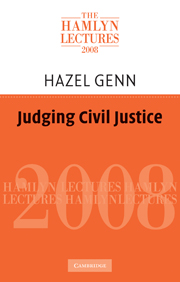3 - ADR and civil justice
what’s justice got to do with it?
Published online by Cambridge University Press: 05 July 2014
Summary
My starting point for this chapter is essentially the conclusion of the previous chapter: that the civil justice system has a significant social purpose and that the fundamental challenge for reformers is how to provide a modern, efficient system that delivers just outcomes by means of procedures that are fair and that are perceived to be so by litigants and other court users – a system that delivers justice and enjoys public confidence. Most importantly, the question is how the public purpose of the civil justice system – in supporting social and economic stability – is achieved in a climate of strained resources and when the demands of criminal justice seem to be unstoppable. I argued that we have been presented with two competing narratives about civil justice: that there is not enough access to justice and that there is too much litigation. As far as the government and some sections of the judiciary are concerned, the answer to both arguments seems to be diverting cases away from the courts and into private dispute resolution processes and in particular mediation. This trend is true of policy in relation to family disputes, civil and commercial disputes and, more recently, administrative justice disputes involving citizen and State. In this context I am interested in reflecting on who and what is driving ADR policy, and why.
My focus is principally on the promotion of ADR for non-family civil disputes and, in particular, judicial and government policy on mediation. While my interest in civil justice reform has inevitably led to engagement with ADR policy, I have also developed a good ground-floor feel for what mediation offers and for its limitations as a result of having undertaken a number of evaluations of court-annexed mediation schemes in England over the last decade. These evaluations involved talking to litigants who had chosen to mediate, those who had rejected the opportunity to mediate, those who felt they had been forced to mediate and those who would have liked the opportunity to mediate. I have watched mediations. I have talked to lawyers about mediation and to mediators about mediation.
- Type
- Chapter
- Information
- Judging Civil Justice , pp. 78 - 125Publisher: Cambridge University PressPrint publication year: 2009
- 1
- Cited by

